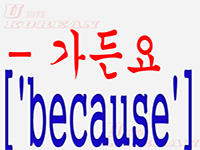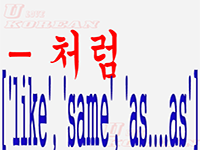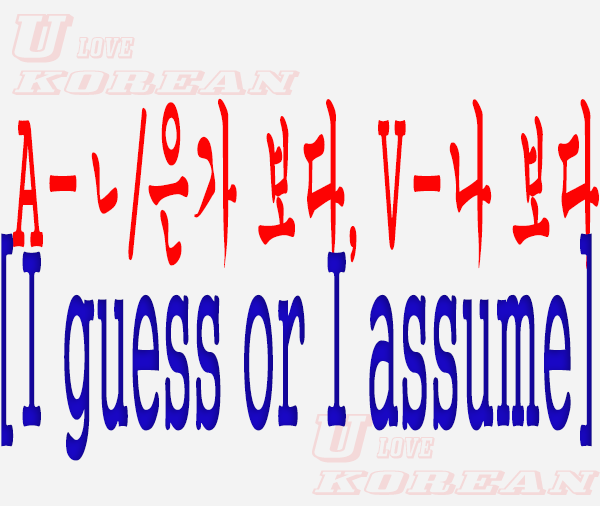New Posts
V-을 뻔하다/ㄹ 뻔하다("almost" or "nearly")

1.'-(으)ㄹ 뻔하다' attaches after a verb stem.
2. This expression is used to indicate that something almost happened, but finally, this action did not happen.
3.It means "almost" or "nearly"
07.10.2023 | You Love Korean
A/V/N(이)기도 하다(sometime....too)

1. meaning of ~기도 하다 seems to be sometime....too.
2. A/V기도 하다 is used to indicate Verb sometime happen.
3. A/V기도 하다 offers other possibilities action or description, in addition to what is mentioned or suggested in the preceding context.
4. N(이)기도 하다 is used to multiple actions or states happen at the same time.
26.09.2023 | You Love Korean
- 가든요(because)

- "거든요" is given a reason or fact something that listener didn't know reason or fact for answer.
- It is used to provide background information before you did something or you didn't do something.
- It is meaning "because"
23.09.2023 | You Love Korean
-처럼('like', 'same', 'as....as')

1. '처럼' used to indicate that it's similar in share or degree to each other.
- It's mean 'like', 'same', 'as....as'
Ex. 오늘은 날씨가 봄처럼 따뜻해요 Today's weather is as warm as spring
23.09.2023 | You Love Korean
- 겠~(I will, I intend to)

* '겠' attaches after an adjectiv / a verb stem.
1. This Grammar use to expressing the speaker plan to do or will to do action.
- It is mean that "I will", "I intend to"
Ex. 일을 열심히 하겠습니다. I will work hard.
23.09.2023 | You Love Korean
A-ㄴ/은가 보다, V-나 보다(I guess or I assume or I must be)

- An expression used to guess about a fact mentioned in the preceding statement.
- Both 나 보다 and (으)ㄴ가 보다 mean "I guess" or "I assume" or "I must be"
- A-ㄴ/은가 보다, V-나 보다 grammar can be replaced by A-(으)ㄴ 것 같다, V-는 것 같다
17.09.2023 | You Love Korean
ㄴ/은/는 대신에(instead of, compensate for)

- ㄴ/은/는 대신에 indicates an one action that can be replaced or compensated by one another action.
- It is mean "instead of, compensate for'
17.09.2023 | You Love Korean
A-아/어여지다(to get or become)

- A~아/어여지다 is attached to an adjective stem, indicating the changes in the state.
- A~아/어지다 Korean grammar pattern is used to say "to get or become ....".
- This expression is only used with adjectives (A-아/어지다). In case of verbs, V-게 되다 is used instead.
14.09.2023 | You Love Korean
V~지 그래요(Why don't you)

- 'V~지 그래요' is used to offer a suggestion or recommendation to someone to do something.
- It has the meaning of "Why don't you......?" or "Why not.....?"
- It is a much weaker and softer express than ~도록 하다
12.09.2023 | You Love Korean
V-다가(while....and-but then)

- V~다가 is used to indicate the speaker's interruption of any action to immediately start doing another action.
- V~다가 can be equivalent to (while)....and/but then in English.
12.09.2023 | You Love Korean
